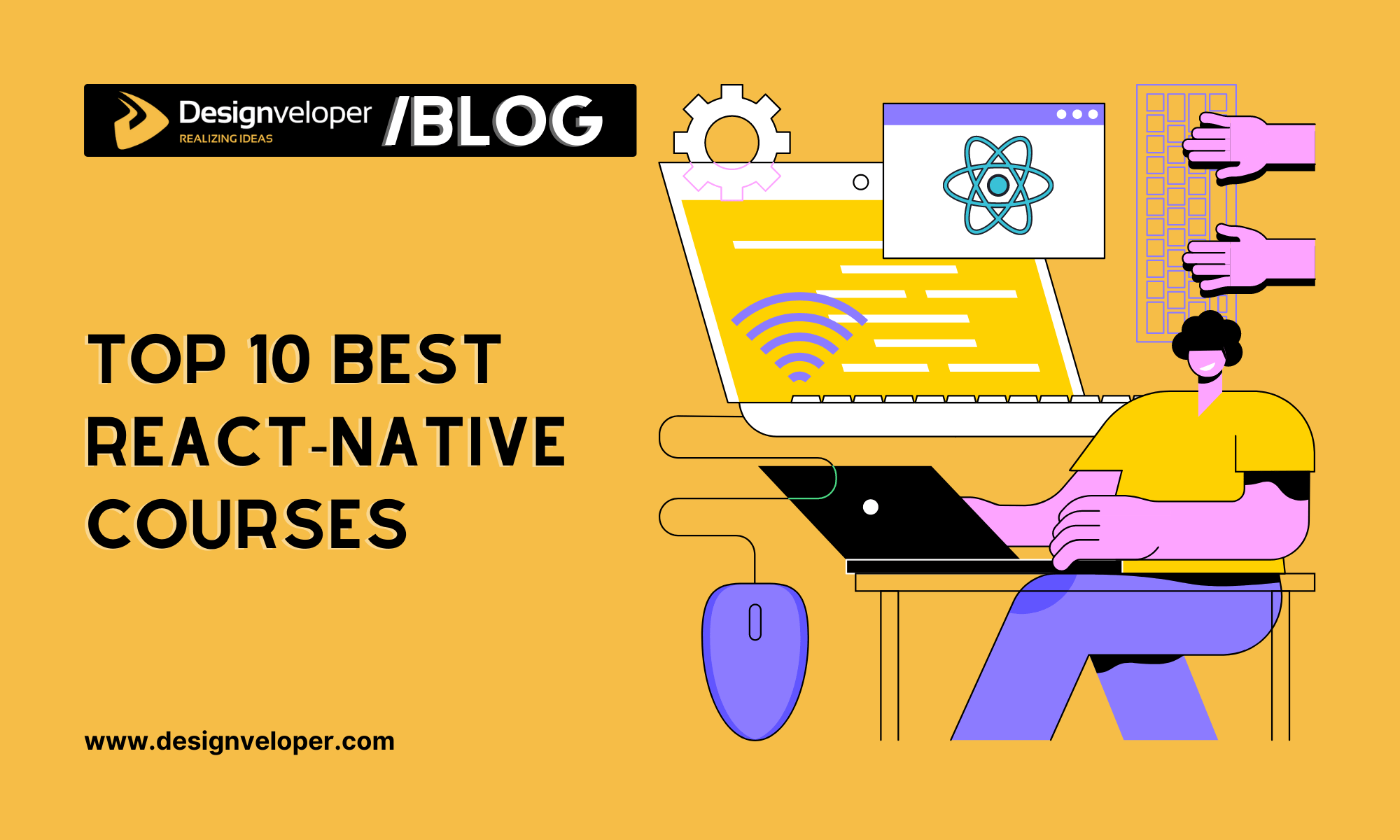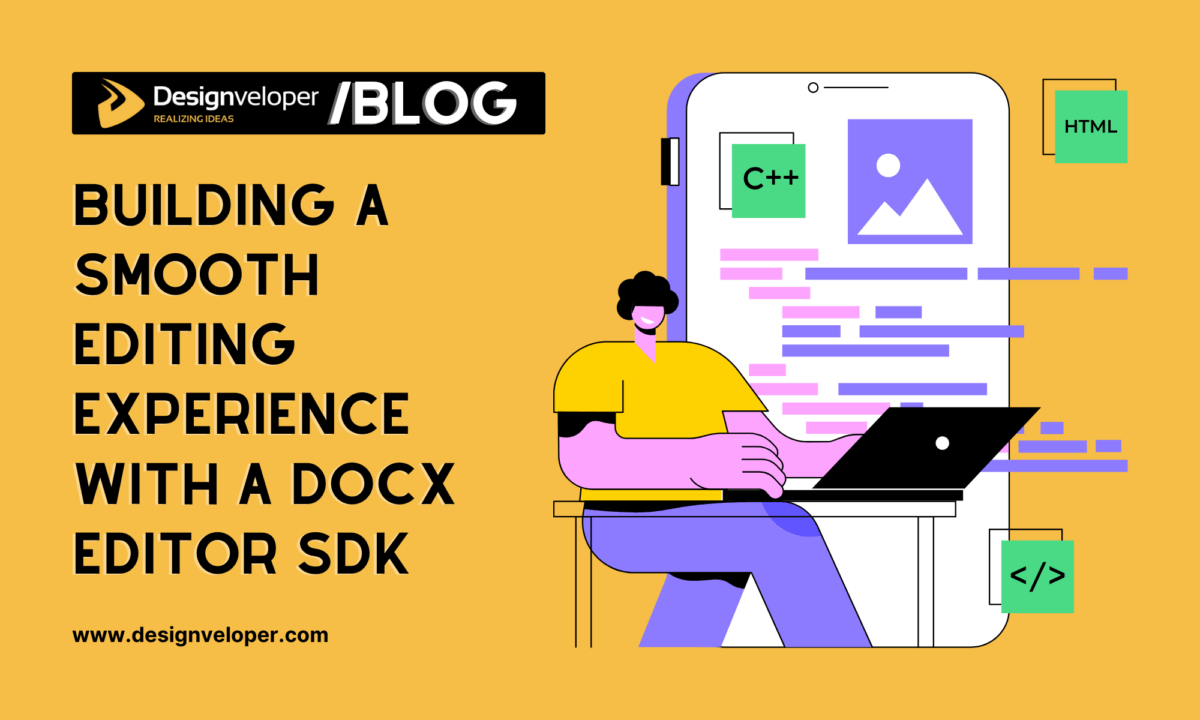
Developed by Facebook in 2015, React Native is an open-source framework widely used to build cross-platform mobile applications for Android, iOS, Web, and Universal Windows Platform (UWP). It allows developers to use JavaScript and React (also called ReactJS – a JavaScript library) knowledge to develop user interfaces (UIs), so React Native is responsible for front-end development.
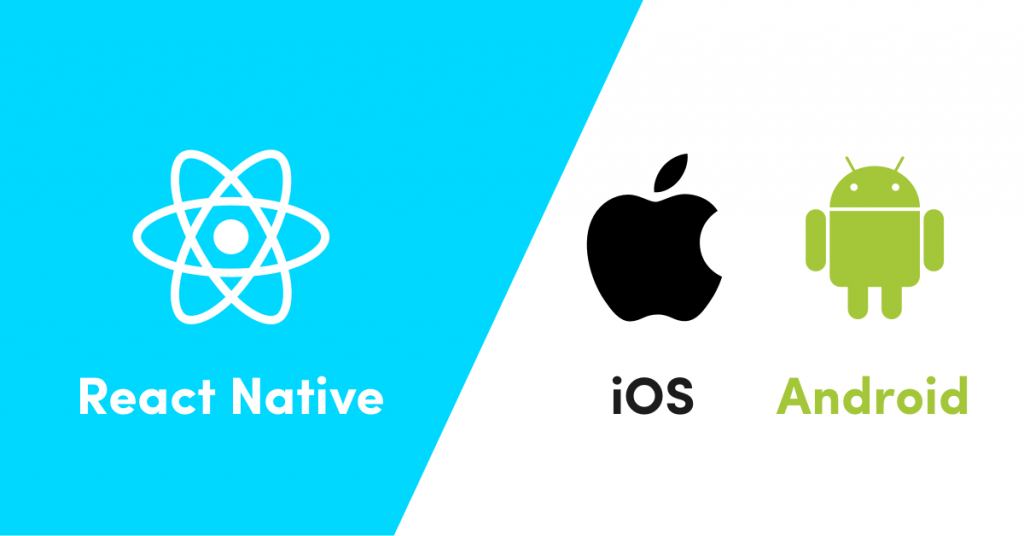
According to Statista, this framework is used by 8.4% of developers across the globe as of 2024. This figure might not be so impressive due to the rising adoption of other frameworks like .NET, Numpy, or Spring. However, React Native still gains popularity in web and mobile app development, with such typical products as Facebook, Instagram, Bloomberg, and Tesla. This is because React Native enables developers to reuse existing JavaScript code, saving much time and effort when crafting new apps or converting from web to mobile apps.
So if you are new and interested in this framework, this article is the right place to start your career and provides a detailed list of React Native tutorials and courses.
10 Best React Native Courses That You Should Learn
However, to facilitate your access to React Native, I advise you to have some knowledge of JavaScript first. Android, iOS, or React is not required.
1. React Native – The Practical Guide (2020 Edition)
- Tuition fees: $39 for a whole course on Academind, yet $129.99 on Udemy
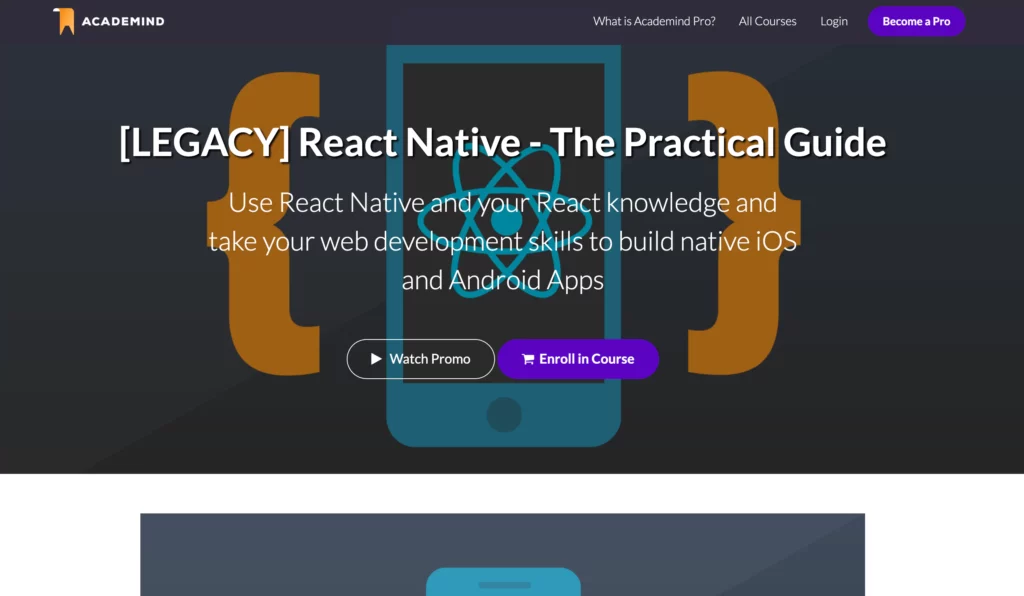
Highly recommended by many students on Udemy, React Native – The Practical Guide is an English course continuously updated by the author, Maximilian Schwarzmüller. It provides in-depth knowledge about React Native to help beginners build native iOS and Android applications without knowing Swift, Objective-C, or Java/ Android. Even when you have no idea of the framework, the instructor also gives a brief yet detailed video on “What is React Native?”
Going from basics to advanced knowledge, the course has 340 lectures with a total length of more than 32 hours, for example adding push notifications to update news for shop apps, building apps without Expo (an open-source platform) or with Redux (a JavaScript library for app state management).
However, the course requires learners to have knowledge of React and JavaScript (ES6+ is highly appreciated). But do not worry, extra lessons on those tech stacks are also provided at the end of the course. After the course, you will get a certificate of completion.
2. The Complete React Native Course (3rd Edition)
- Tuition fees: $19.99
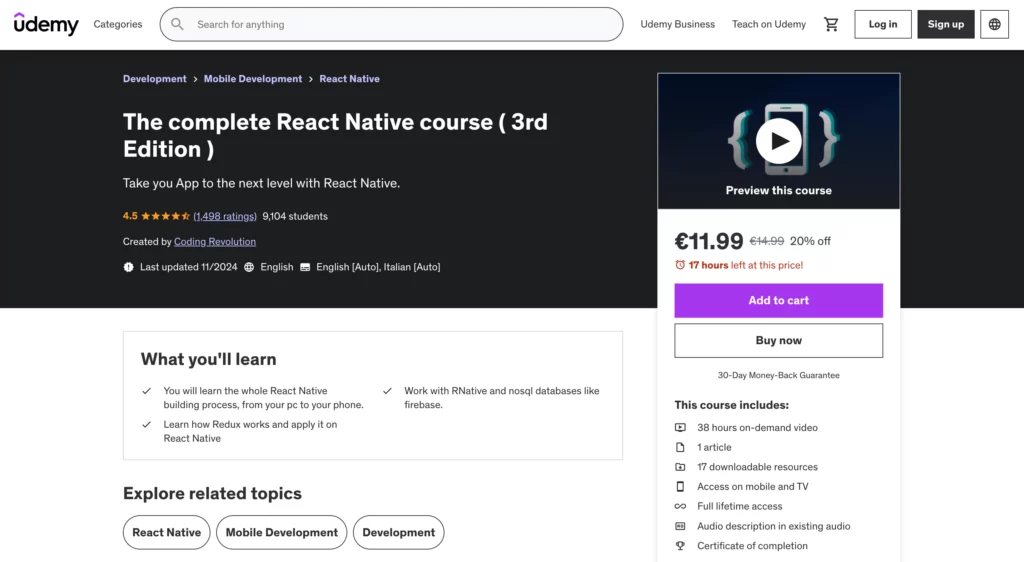
As the most preferred by beginners on Udemy, The Complete React Native Course (3rd Edition) helps students start from the very beginning, like how to install tools for MAC, Windows, and Android.
You are well equipped with the basics, for example, learning how the Redux platform works or connecting projects with Firebase – a mobile platform of Google. Besides, you will be introduced to Hooks – a new addition in React 16.8 version which allows you to use state and React features without writing a JavaScript class.
This course expects its participants to have a little knowledge of at least JavaScript ES5. However, its biggest disadvantage is only having English subtitles, so non-English speakers may struggle with lessons.
FURTHER READING: |
1. A Bird-Eye View of React vs React Native: Key Points |
2. Flutter vs React Native: Which One is Better for Business? |
3. Top 7 Best Resources to Learn React JS for Free |
3. The Complete React Native + Hooks Course
- Tuition fees: $94.99
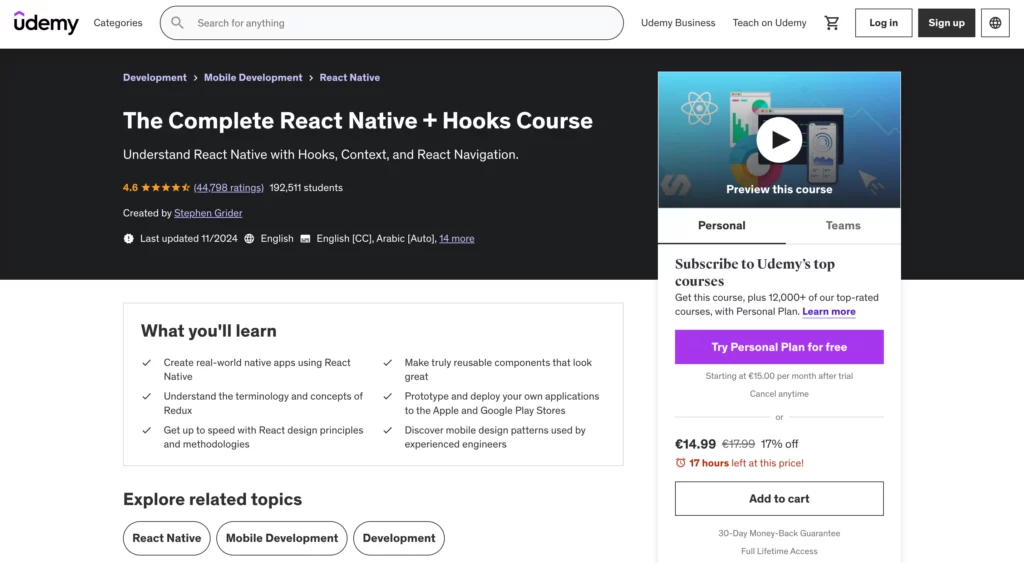
Created by Stephen Grider, this bestseller course includes 425 lectures with React Native versions 0.62.2 and even 0.30.x due to their popularity in the industry. Enrolling in the course, you can acquire fundamental knowledge of JSX (JavaScript XML – a custom markup language used in React), learn to differentiate two React Native elements as “state” and “props”, learn to integrate apps with Firebase for user authentication and understand core principles of React navigation.
This course also requires a basic understanding of JavaScript before you start.
4. React Native For Designers
- Tuition fees: $9 per month, billed annually
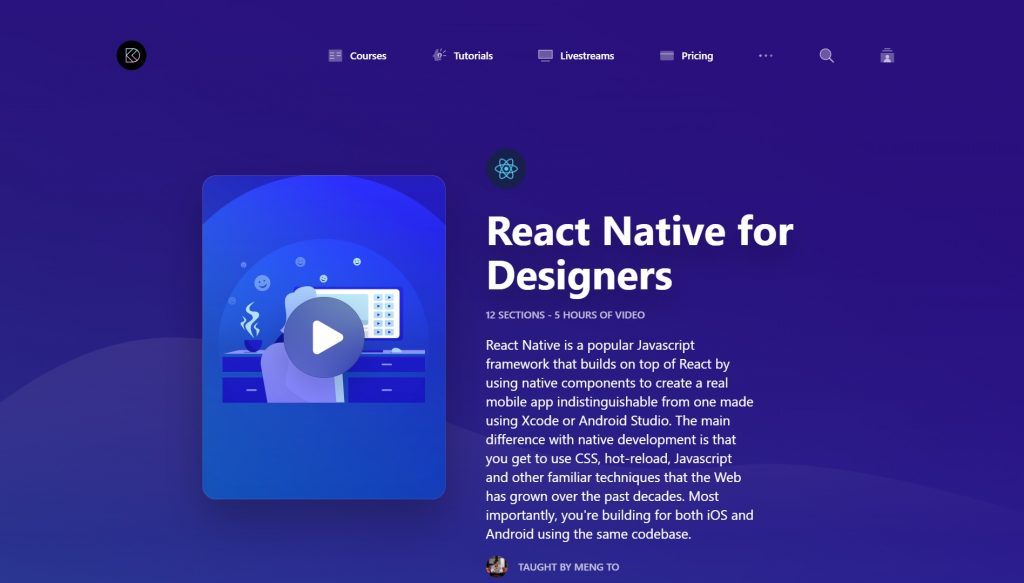
The course is specifically for designers who either switch their job or equip themselves with the fundamentals of React Native for better communication with developers. Indeed, designers sometimes found themselves in conflict with developers over a project due to mutual misunderstanding. So this over 60-hour course will provide necessary information on custom animations, Styled Components, Redux, API data, and adaptive layouts in React Native. Accordingly, you can build cross-platform apps from scratch.
Recommended reading: IT Courses for Tech Leads: Enhancing Management and Leadership Skills
5. CS50’s Mobile App Development with React Native
- Tuition fees: free
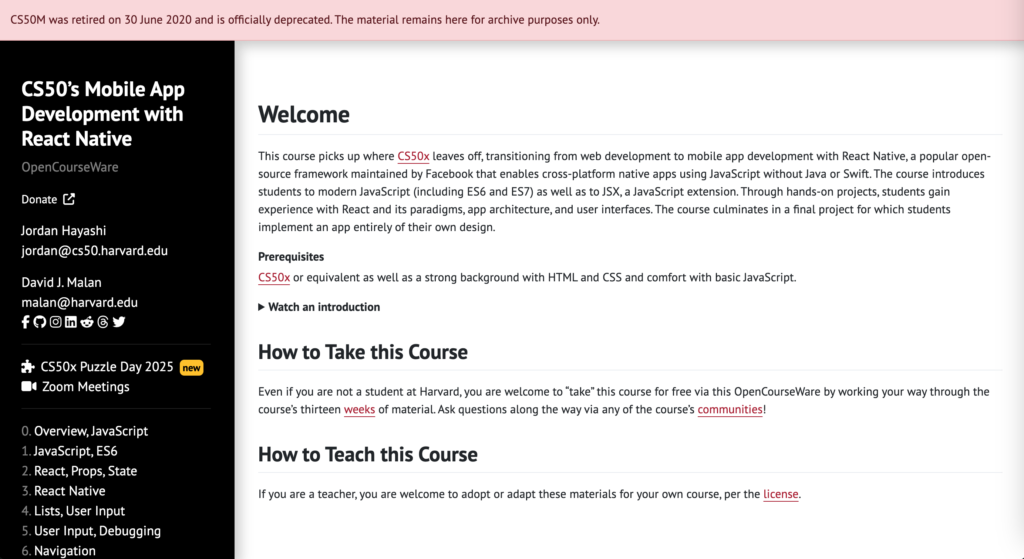
This free course is provided by David J.Malan and Jordan Hayashi from Havard University. Inevitably, you are required to have a strong background in HTML/ CSS and the basics of JavaScript before registration for this intermediate-level course. Therefore the very first lessons are about the overview of JavaScript. However, the focus of the whole course is still developing mobile apps with React Native in four large projects.
The big plus of the course is the variety of CS50 communities available on social channels for information exchange. However, the bad news is that updates and official support for the course officially ceased on June 30, 2020. It means you can’t acquire a verified certificate for this course. So it is not a good option for those who require qualifications for bettering CVs.
Having said that, its content, including lectures, resources, and materials, is still archived on Havard’s CS50 website. Therefore, you can still view its content as a valuable reference for learning React Native.
FURTHER READING: |
1. 10 Common Web Security Threats Businesses Might Face in 2022 |
2. Progressive Web App Tutorial for Beginners in 2022 |
3. What is Drupal? 5 FAQs About Drupal You Must Know! |
6. React Native: Getting Started
- Tuition fees: a free 10-day trial, but then $29 per month, billed monthly
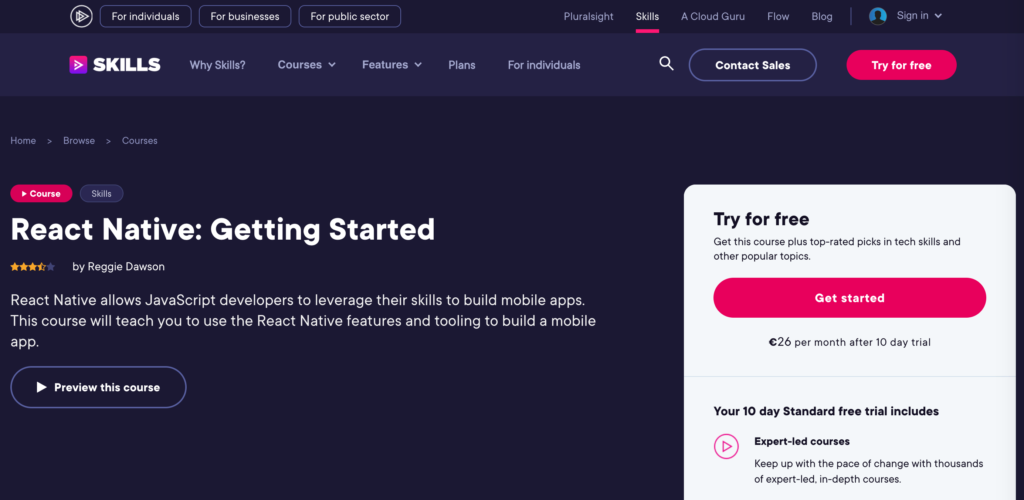
Like others, this beginner course teaches you the basics of building React Native apps. Starting with an overview of how React Native works, the course then guides you to configuring the environment in record time, involving how to debug and operate your apps on mobile devices. After that, you can learn about the React Native components and how to style your layouts professionally or add navigation to your apps. Finally, you will work with Real Data by consuming an HTTP API from apps.
7. React Native by Meta
- Tuition fees: Free, yet requiring fees to get a verified certification
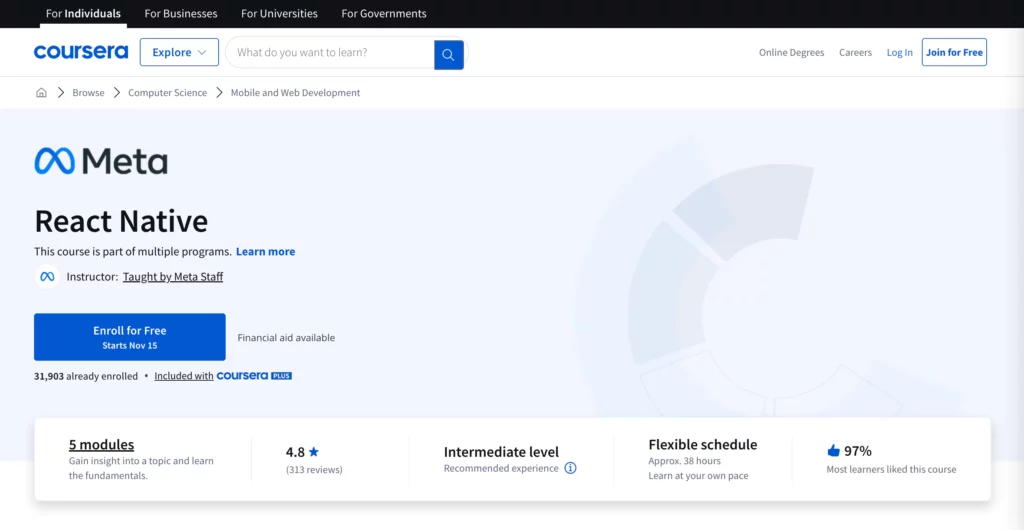
If you want to learn React Native from scratch, why don’t you start with its creator – Meta? The company offers a five-module program on Coursera that guides you from the basics of React Native to a more advanced implementation.
After the course, you’ll acquire some knowledge about React Native components like FastList, SectionList, or Pressable. Further, you can gain hands-on experience with some tools like React, React Native, JSX, code editing programs (e.g., Visual Studio Code or Expo), and front-end programming languages (e.g., HTML, CSS, or JavaScript).
Despite covering the fundamentals of React Native, this course still requires you to get some understanding of React basics and internet navigation skills.
8. Build Full-stack React Native Apps with Express.js Backend
- Tuition fees: $29.99
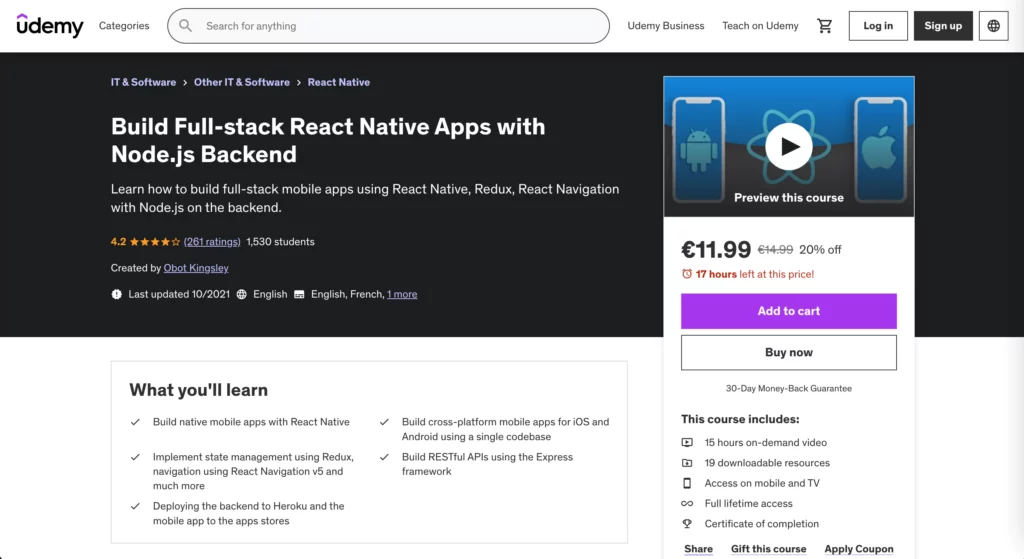
Another preferred course on React Native is definitely the one developed by Obot Kingsley. Similar to others, this course also guides how to make full-stack mobile apps using React Native, Redux, and React Navigation, but with Express.js back end to develop RESTful APIs. To improve your understanding of the framework, the course allows you to join four projects building the Todo app, News app, Home Listing app, and Authentication System app.
Any attendees in the course need basic knowledge of JavaScript (ES6+ is highly suggested) and React.
9. ReactNative.dev
- Tuition fees: Free
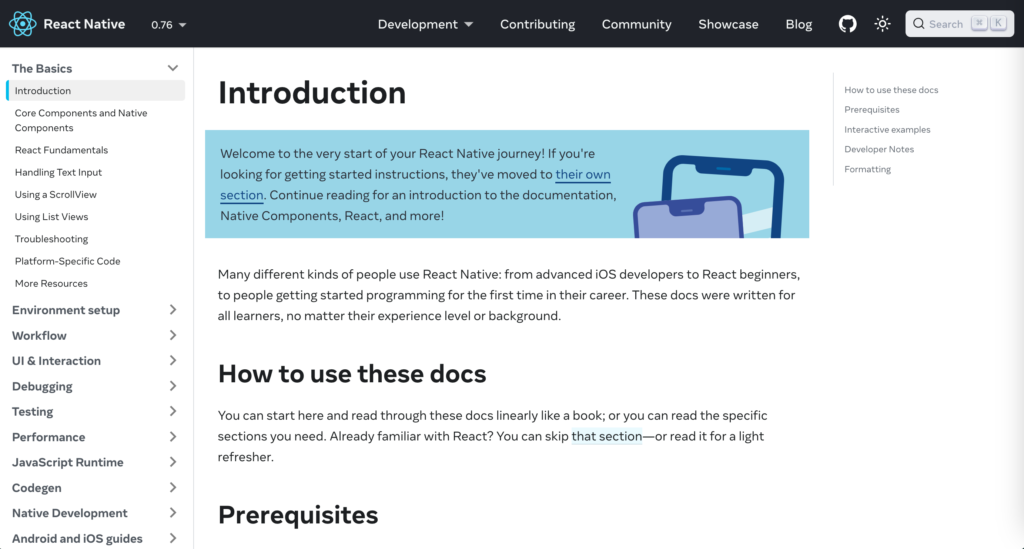
If you prefer reading documents, ReactNative.dev is a free learning platform that provides detailed tutorials on React Native. Owned by Facebook Inc., the website gives learners a wide range of resources on core React Native elements and API.
Even when you struggle with projects related to the framework or need to update relevant news, the website will link you to its communities (e.g. Reactiflux Discord or React Native Spectrum) and blog posts.
However, before starting with those documents, you need a basic knowledge of JavaScript. Although understanding React, Android, or iOS development seemed unnecessary, it still advises you for good knowledge of those technologies to facilitate your study.
10. React Native Tutorial of JavatPoint.com
- Tuition fees: Free
Another best React Native tutorial is created by JavatPoint. It provides basic and advanced concepts of React Native for both beginners and professionals, yet in a better-organized way than ReactNative.dev.
How to Learn React Native Effectively: Designveloper’s Expert Advice
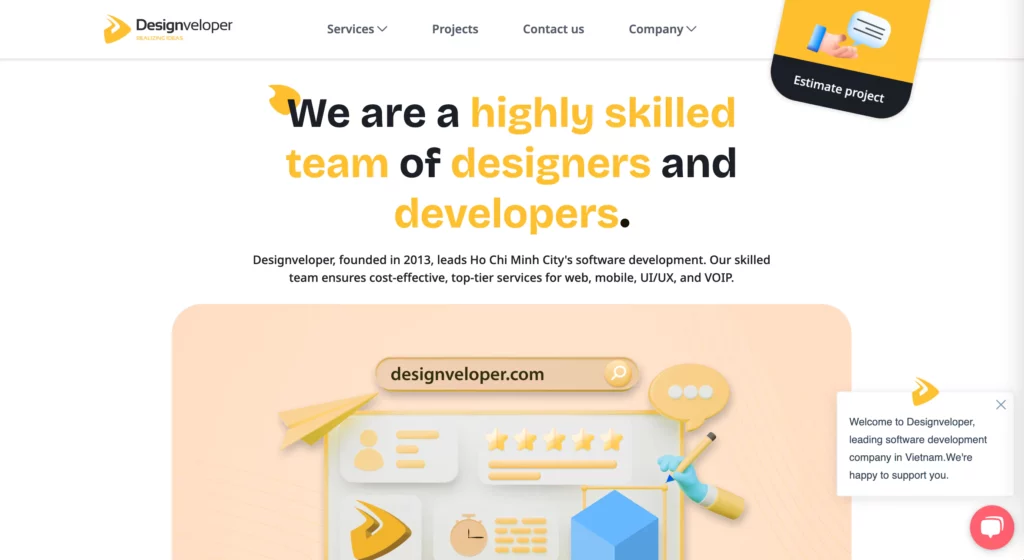
If you’re a newbie in React Native app development, here’s some sound advice from the experts of Designveloper – a Vietnam-based leader in software and mobile app development:
Master JavaScript
JavaScript is a foundational programming language of React Native, so mastering is beneficial to your learning. Accordingly, you can focus on understanding JavaScript basics like variables, functions, objects, arrays, and ES6+ features.
Learn React Native APIs
Some React Native APIs like Image, Text, View, StyleSheet, or TouchableOpacity are the core components to create your app’s user interface. Therefore, familiarize yourself with these APIs.
Understand State Management
State management is a crucial factor behind React Native app development. So, learn about state management solutions like React Context, Zustand, Redux, or MobX.
Practice and Build Real Projects
Focusing only on theoretical knowledge doesn’t make you perfect. Instead, practice is always the best way to apply what you’ve learned and develop your app-building skills. So, begin with small projects and then move to larger ones.
Learn and Use Development Tools
Such tools like Visual Studio Code (or other code editors), React Developer Tools, Chrome Developer Tools, and debugging tools help you create an app and debug effectively. So, learn and use these tools frequently even in your pilot projects.
Join Communities & Find Resources
Learning from fellows and experts is the best way to exchange your experience, enhance your skills, and find solutions for your existing problems with mobile app development. Therefore, join online React Native communities, Facebook groups, forums, and other events (e.g., workshops) whenever possible.
Conclusion
Developing web or mobile apps with React Native Front end has increasingly drawn the attention of those who are interested in the framework. No matter which Reacts Native tutorial or course you participate in, it is advisable to learn from different sources such as blogs or experienced developers unless you want to fall behind in the industry.
Follow our Facebook, LinkedIn, and Twitter to read more blog posts like this.






Read more topics




























